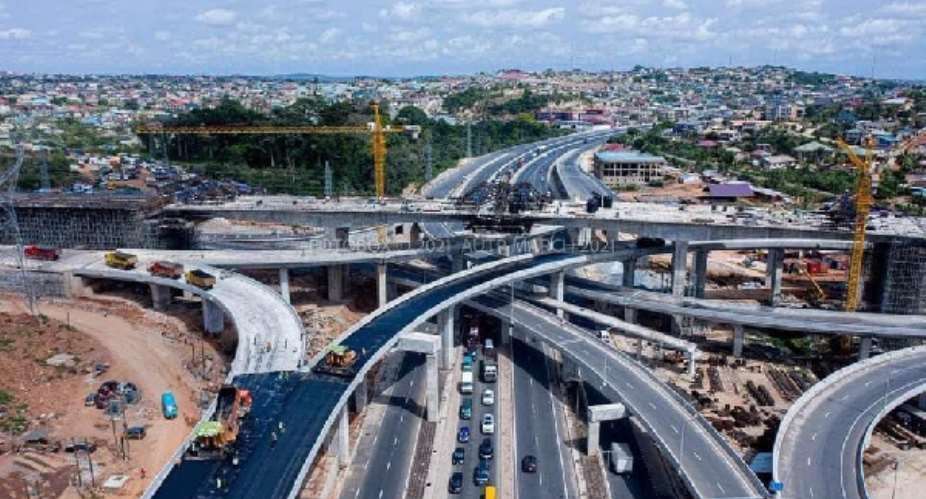As a real estate consultant with a strong passion for job creation in the industry, I am particularly excited by news headlines that include terms like “sod-cutting” and “commissioning.” Research clearly shows that one of the key factors driving increases in property values is infrastructure development within our communities.
Another reason I’m enthusiastic about infrastructure development is the job opportunities it creates for professionals in the built environment. These opportunities span a wide range of activities, including feasibility studies, architectural and structural design, preparation of bills of quantities, compensation valuations, construction project management, and facilities management, among others.
The question then arises: to what extent does infrastructure development influence the choices of Ghanaian voters? During election campaigns in Ghana, ruling governments typically emphasize their contributions to infrastructure development, while the opposition focuses on the rising cost of living. For example, the slogan “Hwe wo asetena mu na to aba pa” (Vote based on your assessment of your cost of living) helped the New Patriotic Party (NPP) win the 2000 election. Similarly, the slogan “Petrol Mo Papa mo tumi to?” (Can your parents afford the cost of fuel?) contributed to the late Professor Atta Mills and the National Democratic Congress (NDC) winning the 2008 elections. In 2016, the NPP campaigned with the message, “We want change, not interchanges,” which secured their victory. In the recently conducted 2024 elections, the NDC reminded voters of what the NPP had communicated in 2000 and 2016, which resonated with many Ghanaians and ultimately won their support. The background may lead the Ghanaian politician to consider whether infrastructure development is relevant to the decisions of the average Ghanaian voter.
One of the most visible indicators of a nation’s growth and prosperity is its infrastructure development, seen from ancient Rome to modern-day Dubai. However, why do Ghanaian voters seem to overlook infrastructure development when making their electoral decisions? Below is an opinion of how the average Ghanaian voter factors infrastructure development in election decision-making.
Uneven distribution of infrastructure development across the country
I once had an interaction with an Australian who visited my village, he mentioned he had never visited Sydney, the most populous city in Australia. As a young Ghanaian in the village, my first question was how then did you get to Ghana? Because then the only way to access a commercial airline to travel out of Ghana was through Accra’s Kotoka International Airport. Further conversation with the Australian who also lived in a rural Australian community revealed that infrastructure development was evenly distributed in the country such that one need not travel to cities or capital cities to access certain infrastructure contrary to the case in Ghana.
Over the years, Ghanaian politicians have mainly concentrated on infrastructure development in major cities and neglected other communities. This has long been a significant obstacle to Ghana’s economic development: rural-urban migration. A significant number of rural youth move to urban centers each year due to inadequate basic infrastructure in their communities, which hinders job creation and a modern lifestyle. I had my secondary education in the prestigious Prempeh College in Kumasi where most of my mates were residents in Kumasi and surrounding communities. Shortly after our first degree, I noticed that most of them moved to Accra due to the disparity in job opportunities and access to infrastructure between Kumasi and Accra.
The impact of the factors mentioned above has significant consequences, particularly in the real estate sector. The infrastructure developments promoted by the politicians are unable to fully address the problems they were intended to solve, in most cases, the populations of the communities outgrow the capacities of the infrastructures before they are commissioned largely due to rapid urbanization fueled by rural-urban migration.
In the real estate sector, infrastructure developments benefit investors by increasing property values and rental income. However, the rise in property values significantly impacts average Ghanaians, particularly first-time home buyers and tenants, who make up the majority of the population. The increasing cost of rent leaves city residents with little disposable income for other necessities, impacting their overall cost of living. Considering the fact that most Ghanaian tenants must pay rent two years in advance. In this case, the infrastructure development benefitted a few but disadvantaged the majority.
Politicians should focus on evenly distributing infrastructure developments across the country. This approach would lead to the uniform development of all cities and towns, reducing the over-concentration of the population in major cities. Furthermore, spreading development evenly would create job opportunities throughout the country, which would help reduce rural-urban migration and alleviate pressure on urban infrastructure. The private sector, such as estate developers, would contribute to the development of other areas of the community when the necessary infrastructure is available.
Infrastructure Development serving as a catalyst for corruption
Infrastructure development in Ghana has, over the years, become a means for politicians to siphon funds from the public. The potential for corruption exists in the planning, funding, implementation, and management of these infrastructure projects. Ghanaian citizens have long expressed frustration about inflated budgets for state infrastructure and the lack of value for money in these initiatives. Many projects are plagued by procurement violations, with contracts awarded to party loyalists regardless of their ability to execute the work or the results of cost-value analyses. As a result, these projects are often poorly executed, failing to meet their intended purposes and lasting only a short time, despite their significant costs.
The average voter tends to overlook the benefits of infrastructure development and instead focuses on concerns about the mismanagement of public funds. These mismanaged funds could have been used to expand infrastructure in other areas. As a result, infrastructure development can lead to resentment towards politicians rather than fostering support for them.
Infrastructure Development and their effect on fiscal policy
Infrastructure developments have profound implications for fiscal policy—the government’s use of taxation, spending, and borrowing to influence the economy. In most cases, the government’s high ambition to increase the nation’s infrastructure development results in two major fiscal policies that directly or indirectly affect the cost of living of the average citizen. It’s either, the government increases taxes or increases borrowing (public debt). Increases in taxes have the effect of reducing the disposal income of the average voter and in the same vein fueling the cost of living. Increased borrowing by the government also has the effect of increasing interest rates and competition with the private sector for citizens’ savings. The increase in rates affects the cost of borrowing affecting the average Ghanaian in areas such as access to mortgages and interest on mortgages. The increased interest rates have the effect of increasing the cost of doing business affecting the profits of firms and limiting the opportunities of job creation.
Ghana’s current economic challenges have contributed to a rise in public debt, which now exceeds 70% of GDP. This increase is primarily due to borrowings aimed at financing infrastructure development. The increased cost of servicing interest on these debts leads to increases in taxes and in the same vein, living government limited funds to support social initiatives such as rent assistance to the poor or the provision of affordable housing.
Conclusion
Infrastructure development plays a crucial role in Ghana’s socioeconomic and political landscape, shaping electoral preferences, influencing fiscal policies, and impacting citizens’ quality of life. While it drives growth by creating jobs, boosting property values, and enhancing urban development, its uneven distribution intensifies rural-urban migration and strains urban centers.
Additionally, infrastructure projects often become avenues for corruption, undermining public trust and reducing the usefulness of such investments. Fiscal policies tied to infrastructure financing, such as increased taxation and borrowing, can inadvertently raise the cost of living and stifle economic opportunities for the average Ghanaian. To truly harness infrastructure development as a tool for national progress, policymakers must prioritize equitable distribution, enhance transparency in project execution, and adopt sustainable financing models that balance economic growth with social equity. By addressing these challenges, infrastructure can transform from a divisive electoral issue to a unifying force for Ghana’s holistic development.



